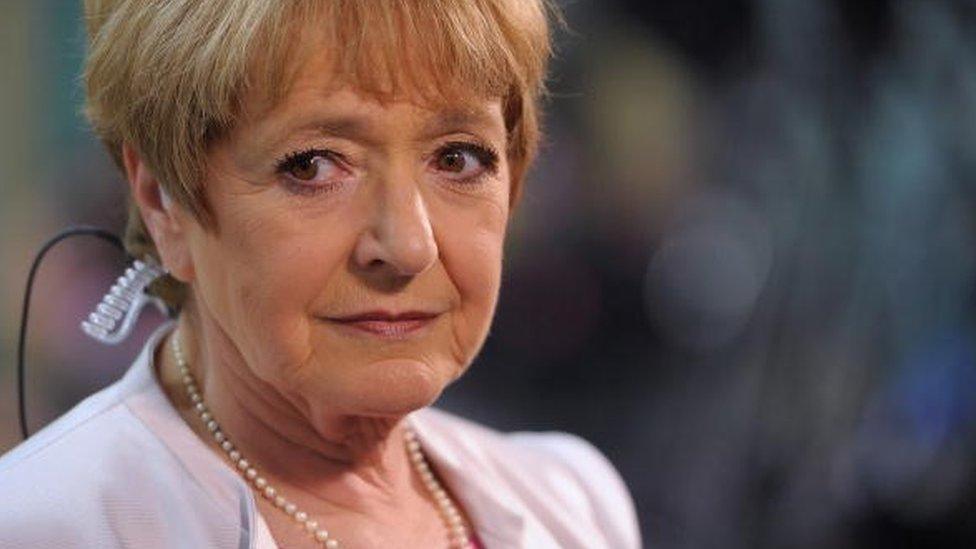Margaret Hodge faces 'action' over Corbyn anti-Semitism row
- Published

Dame Margaret Hodge has been a fierce critic of Labour's new anti-Semitism guidelines
Labour MP Margaret Hodge faces "action" by the party after reportedly swearing at Jeremy Corbyn and calling him an "anti-Semite".
A spokesman for the Labour leader said what had happened was "clearly unacceptable between colleagues".
The alleged confrontation came after Labour adopted new guidelines on anti-Semitism, which were criticised by some Jewish leaders and some MPs.
Ms Hodge said she chose to "confront" Mr Corbyn to express her "outrage".
The code of conduct was rubber-stamped by the executive committee on Tuesday.
It says: "Anti-Semitism is racism. It is unacceptable in our party and in wider society."
But it does not include all of the "working examples" given in the International Holocaust Remembrance Alliance's (IHRA) definition of anti-Semitism, external.
Following criticism, Labour said it would "reopen development of the code" in consultation with Jewish groups.
Dame Margaret, the MP for Barking, clashed with Mr Corbyn in the Houses of Parliament on Tuesday.
Mr Corbyn's spokesman declined to reveal the precise nature of the action being taken against her but said it would be taken under Parliamentary Labour Party procedures requiring MPs to behave in a "respectful" way towards colleagues and not to "bring the party into disrepute".
Without confirming the language she had used, Dame Margaret wrote in The Guardian, external that she "confronted Jeremy Corbyn in Parliament and told him to his face what I and many others are feeling".
Labour was "so distrusted by the Jewish community, we are the last people on earth, at this time, who should think about amending a widely accepted definition of anti-Semitism", she said.
The Israel-Palestine conflict, she said, had been "allowed to infect the party's approach to growing anti-Semitism" saying she and other Jewish MPs had received growing amounts of anti-Semitic abuse.
In adopting its new code, the party "chose to make the party a hostile environment for Jews", she said, adding: "I stand by my action as well as my words."
The decision to take action against Dame Margaret has been criticised, with Karen Pollock, chief executive of the Holocaust Educations Trust, describing it as "extraordinary and just appalling".
Former Foreign Secretary David Miliband tweeted: "It is the Labour leadership which has brought the party into disrepute - not Margaret Hodge. How dare they preach about 'respect between colleagues' when this very code legitimises the most appalling disrespect."
Different wording
Labour's code of conduct was drawn up after the 2016 Chakrabarti inquiry that followed allegations of anti-Semitism within party ranks.
The code does reproduce the IHRA's "working definition" of anti-Semitism and lists behaviours likely to be regarded as anti-Semitic - but critics point out that it leaves out four examples from that definition:
Accusing Jewish people of being more loyal to Israel than their home country
Claiming that Israel's existence as a state is a racist endeavour
Requiring higher standards of behaviour from Israel than other nations
Comparing contemporary Israeli policies to those of the Nazis
Labour's code says it is "wrong" to accuse Jewish citizens of being more loyal to Israel than their own country. And it says that using Nazi comparisons in Israel-Palestine debates "carries a strong risk of being regarded as prejudicial or grossly detrimental to the party", triggering a disciplinary investigation.
A party spokeswoman said: "The code of conduct adopts the IHRA definition and expands on and contextualises the IHRA examples to produce robust, legally sound guidelines that a political party can apply to disciplinary cases."
Mr Corbyn has said he is "committed to eliminating anti-Semitism wherever it exists".
"Prejudice and hatred of Jewish people has no place whatsoever in the Labour Party," he said earlier this year.